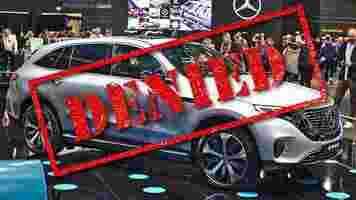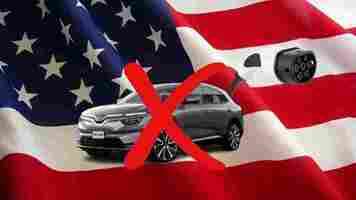Sorry ’murica, no Mercedes-Benz EQC for you
After delaying the launch of its electric SUV, the EQC, in the US, Mercedes-Benz has decided to cancel its launch all together.

According to US car site Autoblog , the EQC was originally supposed to debut in America this year, however that timeline was pushed back to 2022.
Unfortunately for Americans the EQC is now off the cards. Speaking to Autoblog , a Mercedes spokesperson declared:
There is still a glimmer of hope. It’s not an entirely definitive statement, and it seems to leave the door somewhat ajar for the EQC making it to the US some day.
According to the spokesperson, the next Merc EV to launch in the US will be the EQS, the electric alternative to the German marque’s high-end luxury sedan, the S-Class. That new car is expected to be unveiled soon, and will be on sale for deliveries next year.
SHIFT is brought to you by Polestar. It’s time to accelerate the shift to sustainable mobility. That is why Polestar combines electric driving with cutting-edge design and thrilling performance. Find out how .
30kg of raw materials vs. 17,000 liters of oil — EVs create far less waste than gas cars
Y’know, I thought we’d put this one to bed , but if you need more evidence that battery electric vehicles are better for the environment than gasoline cars, check this out.

According to a new analysis seen by The Guardian , over the course of an EV ‘s life, just 30 kg of raw materials will be lost from its lithium-ion battery — once recycling is taken into account. However, in gasoline vehicles, 17,000 liters of oil will be lost, and well, there ain’t no recycling that!
The analysis was conducted by Transport & Environment (T&E), a non-profit organization campaigning for cleaner transport based in Brussels, Belgium.
T&E argued that battery electric vehicles and gasoline cars are often held to differing standards when these kinds of comparisons are made. It noted that oil use is often taken for granted, and an unfair focus is placed on the environmental impact of extracting metals required for lithium-ion batteries.
In attempts to allay environmental concerns, battery makers are moving to new technologies which require fewer precious metals.
For an EV, T&E says its mined raw materials equates to the size of a football, whereas gasoline cars will burn a stack of oil barrels 25 stories high.
In the interest of fairness, EVs do generate emissions whilst being manufactured. However, once made, an EV doesn’t produce emissions, so over its entire life it can claw back and offset those nasty gases.
T&E also suggests that EVs use 58% less energy than a gasoline car over its entire life, and emits 64% less CO2. Previous research states that the average EV offsets its production emissions within 16 months of ownership .
SHIFT is brought to you by Polestar. It’s time to accelerate the shift to sustainable mobility. That is why Polestar combines electric driving with cutting-edge design and thrilling performance. Find out how .
EVs are un-American, study finds
Biden might be pushing for electrification , but Americans aren’t onboard. Well, that’s what a study by Deloitte has found at least.

Amongst the 1,031 American respondents, nearly two-thirds preferred sticking to conventional gas-guzzlers for their next vehicle purchase.
Some 17% would consider a hybrid electric vehicle (HEV), while only 5% would get a plug-in hybrid (PHEV), or a battery electric vehicle (BEV).
Conversely, consumer interest in BEVs is highest in South Korea (23%), China (17%), and Germany (15%).


Unsurprisingly, range anxiety and lack of public charging infrastructure are the main reasons why respondents from all countries wouldn’t consider an EV as their next vehicle.
For Americans, driving range is the biggest concern among the two, and the survey shows that they have great expectations when it comes to their vehicle’s juice.
In fact, they’d need a whopping 800km range to buy an EV — double the range the Chinese, Japanese, and Indian consumers cite, for instance.
Yes, Americans drive more than anyone else in the world , and the average driver makes around 1,600km per month .
Looking at the data above, this means they’d opt for an electric vehicle if its range could cover half the distance they travel monthly.
What’s more, 30% of the US respondents believe that EVs have a similar environmental impact compared to conventional vehicles, while 21% believe they’re even more harmful.
While the survey’s sample is limited in number, there’s still an important conclusion we can make: the EV message hasn’t been well communicated to American consumers.
While range anxiety is a reasonable demotivating factor, the excessive range expectations indicate that consumers aren’t still fully aware of EVs’ capabilities or mode of operation. The same goes for their environmental benefits.
And given that personal vehicles remain the preferred mobility choice for 76% of the US respondents, it’s vital that conventional cars are — at least — gradually replaced by their electric counterparts.
Unsurprisingly, this calls for further action from the government. Thank god all Americans are united on that at least.